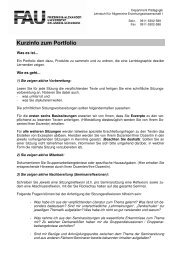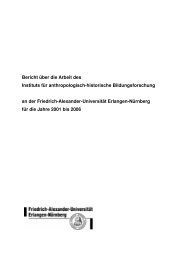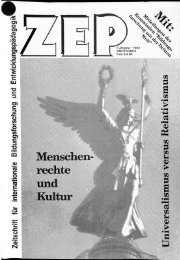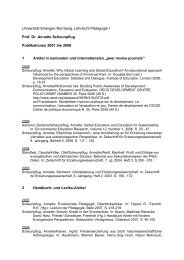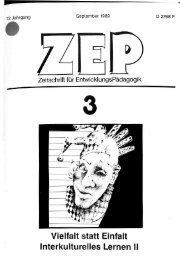ZEP - Lehrstuhl für Allgemeine Erziehungswissenschaft I
ZEP - Lehrstuhl für Allgemeine Erziehungswissenschaft I
ZEP - Lehrstuhl für Allgemeine Erziehungswissenschaft I
Erfolgreiche ePaper selbst erstellen
Machen Sie aus Ihren PDF Publikationen ein blätterbares Flipbook mit unserer einzigartigen Google optimierten e-Paper Software.
<strong>ZEP</strong>30. Jg. Heft 1 März 2007 Seite 23(3) The Availability of InformationAside from developing the skills outlined above, the individualneeds an ongoing supply of clear, balanced informationon which to base their decisions and views. This includesinformation relating to:- Their ‘global awareness’ – including understanding of theglobal situation, the links between individual issues, and theinfluence they have as individuals on the rest of the world;- The sources of information they receive and how this mightaffect the information they receive from these sources;- The alternative options available in all areas of life.How to Gain these Tools and ConditionsIn order to apply these recommendations equitably insociety, we need to ensure that the circumstances of everyindividual are such that they are given the opportunity todevelop the skills and access the information – from theday they are born. This article will not undertake a detailedexploration of the broader socio-political conditions that willbe needed to deliver the above skills and information to thepublic, but summarised below are some of the basic waysthese could be delivered:(1) EducationThe majority of the skills of ‘Intellectual Independence’could be delivered within the education system. Indeed,many of these are already delivered within the ‘Citizenship’component of the UK National Curriculum. 4 The educationsystem could also deliver a significant proportion of the skillsrelating to ‘Values Awareness’.Currently, the UK curriculum doesn’t provide a sufficientlyrigorous appraisal of current global economic orthodoxy,and it could also provide greater focus on the philosophicalterritory of morality and how to live more effectively withone’s values. Additionally, education on these topics needsto be extended beyond children, as many adults remain justas ill-equipped as children in relation to them.(2) SocietyOther ways of delivering these conditions and skills include:- A national ‘World Awareness Information Service’ thatprovides information on the world and areas such as the linksbetween people’s actions and their consequences. Some ofthis service could possibly be provided by organisationssuch as the Development Education Association (www.dea.org.uk);- A national ‘Ethics Support Service’ that helps people toconsider what values are, what their values are and how toput them into practice;- Legislation to regulate certain types of ‘mental input’ thatare deemed to be particularly manipulative and damaging topeople’s intellectual independence – for example, banningadvertising to children.(3) Specifi c OrganisationsA final possibility to mention in this section is the developmentof initiatives that are designed specifically todeliver the individual skills mentioned in this article. Onesuch scheme under development, called ‘just think…’, isa course that aims to empower the ordinary individual todevelop a well-informed, considered and independent approachto living within the confusion and complexity of themodern world. For more information on the scheme, visitwww.justthink.org.uk.Overcoming the Barriers 2 –What the Movement Can DoNow we will consider what the Movement can do to addressthe barriers in its direct communications to the public.The selected recommendations are as follows:Make an Investment in Educating PeopleAlongside shorter term aims such as raising funds or campaigningon a specific issue, the Movement needs to makean investment in the long-term aim of changing people’sattitudes and behaviour in its direct communications with thepublic.This long-term investment requires a greater level ofinformation, delivered in a clear and accessible way. Perhapsmost importantly, it requires organisations to incorporate an‘education strategy’ component into their communicationplans which sets out the role that each communication departmentintends to play in educating the public, the goalsit is setting itself to achieve this and the specific ways it willdeliver this.Contextualise Individual IssuesIn their direct communications with the public, eachorganisation in the Movement should constantly seek toshow how its own area of interest fits within the context ofthe world in general, links to other issues and fits within theoverall values of the Movement.Make Their Values More ExplicitEach member of the Movement should be more explicitabout the values that lie behind their focus on the particularissue that they communicate to the public. For example,behind the campaign to release Chinese political prisonersmay be the value that ‘everyone should have freedom ofspeech’.Show their Full Range of ValuesIn fact, organisations should go beyond the above point,and show the full range of basic values they hold. It wouldalso be useful if they could show how they prioritise thesevalues, where they draw the line in any choices betweendiffering values and the methods they use to make thesedecisions. A possible delivery channel for this is a detailed‘values statement’ by each organisation.Provide an Overall VisionOrganisations within the Movement should provide thepublic with a description of the world they want to see in thefuture – the world they are working towards.





